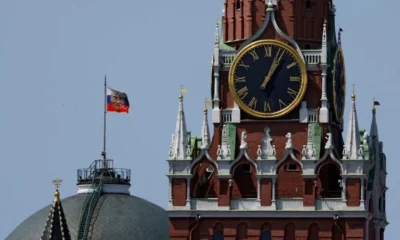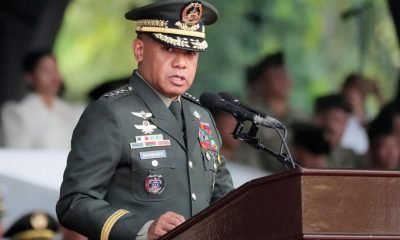Top stories
Blinken’s Visit to Laos for ASEAN and East Asia Summits

U.S. Secretary of State Antony Blinken’s upcoming visit to Vientiane, Laos, marks a pivotal moment in U.S. engagement with Southeast Asia, a region that has become increasingly central to geopolitical competition. Blinken will attend the ASEAN-U.S. Summit and the East Asia Summit, both critical forums for diplomacy in the Indo-Pacific. His mission is multifaceted, encompassing regional security, economic collaboration, and addressing pressing international crises, such as the conflict in Myanmar and Russia’s invasion of Ukraine.
Representing President Joe Biden, Blinken’s participation in these summits underscores the Biden administration’s commitment to strengthening ties with Southeast Asia. ASEAN, comprising 10 member states, has long been seen as a crucial player in maintaining stability and economic growth in the Indo-Pacific. The region’s strategic location and economic potential make it a key arena for U.S. interests, particularly as Washington seeks to counterbalance China’s growing influence.
In 2023, U.S.-ASEAN trade reached $395.9 billion, solidifying the U.S. as the region’s second-largest trading partner after China. Blinken’s agenda will likely focus on furthering economic cooperation, especially in critical sectors like semiconductor supply chains, as the U.S. seeks to diversify away from China in key industries. Beyond trade, the U.S. is also the largest source of foreign direct investment in ASEAN, contributing $74.3 billion in 2022. Strengthening these economic ties will be vital as Washington seeks to solidify its influence in the region.
Key Issues: Myanmar and the South China Sea
One of the most pressing topics during Blinken’s visit will be the ongoing crisis in Myanmar. Since the military coup in 2021, Myanmar has been engulfed in violence, with the junta planning elections in 2024 despite widespread conflict. Daniel Kritenbrink, U.S. Assistant Secretary of State for East Asian and Pacific Affairs, voiced concerns that any elections under the current conditions would be illegitimate and could exacerbate violence. The U.S. position is clear: peace and reconciliation must come before any electoral process.
Myanmar, however, is just one piece of the puzzle. The South China Sea remains a flashpoint for territorial disputes, particularly involving China’s expansive claims that overlap with those of ASEAN members like Vietnam and the Philippines. Upholding international law in the South China Sea is a cornerstone of U.S. policy, and Blinken is expected to reiterate this position during his discussions in Vientiane. The U.S. has consistently supported ASEAN members’ rights under the United Nations Convention on the Law of the Sea (UNCLOS), a stance that directly challenges China’s actions in the region.
The East Asia Summit, which brings together ASEAN members and major global powers including China, India, Japan, South Korea, and Russia, will provide a broader platform for addressing global geopolitical tensions. Russia’s war against Ukraine, a critical issue for U.S. foreign policy, will likely be a point of contention, especially as Russia’s Foreign Minister Sergey Lavrov is expected to attend. While ASEAN countries have diverse stances on the conflict, Blinken will likely use the summit to rally support for Ukraine and condemn Russian aggression.
Susannah Patton, Director of the Southeast Asia Program at the Lowy Institute, highlighted the challenge of achieving substantive outcomes in these multilateral forums. According to Patton, while the East Asia Summit will issue joint statements, real progress on contentious issues may be elusive. The polarization of global politics has made it increasingly difficult for dialogue partners like the U.S., China, and Russia to agree on language regarding international conflicts, let alone cooperate on solutions.
This year’s ASEAN summits are notable not only for their geopolitical significance but also for the emergence of a new generation of Southeast Asian leaders. Paetongtarn Shinawatra, Thailand’s newly elected Prime Minister, will attend her first ASEAN Summit. At just 38 years old, she represents a generational shift in the region’s leadership. Similarly, Singapore’s Lawrence Wong, who succeeded long-serving Prime Minister Lee Hsien Loong earlier this year, will be making his first major appearance at the summit.
Japan’s new Prime Minister, Shigeru Ishiba, also assumed office just days before the summit, further highlighting the transition in leadership across key U.S. allies in the region. Ishiba has already pledged to strengthen Japan’s alliance with the U.S., a critical relationship amid rising tensions with China and North Korea.
As Blinken heads to Laos, the stakes are high for both the U.S. and its partners in the Indo-Pacific. While the U.S. aims to deepen its engagement with ASEAN, it faces significant challenges, from managing its rivalry with China to addressing the multifaceted crises in Myanmar and Ukraine. The upcoming summits offer an opportunity for the U.S. to reaffirm its commitment to the region, but as experts like Susannah Patton have noted, achieving concrete progress will not be easy.
The Indo-Pacific remains a region of both immense opportunity and considerable risk, and Blinken’s visit to Laos will be a critical test of U.S. diplomacy in an increasingly complex and polarized world.
Top stories
Putin: Russia Could Cut EU Gas Immediately
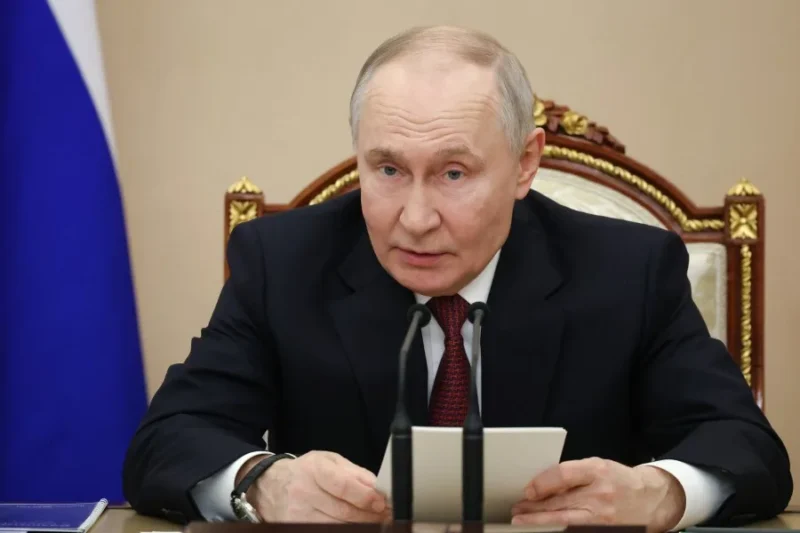
Russian President Says Moscow May Redirect Energy Supplies to “Reliable Partners” Instead of Waiting for EU Ban.
If Brussels plans to quit Russian gas anyway, Putin asks: why wait?
Russian President Vladimir Putin said Wednesday that Moscow could halt gas supplies to the European Union preemptively rather than wait for Brussels to formally phase out Russian energy imports.
Speaking after hosting Hungarian Foreign Minister Peter Szijjarto at the Kremlin, Putin suggested Russia may be better off withdrawing from the European market now and shifting exports to what he called “reliable partners.”
“If we’re going to get shut off in a month or two, we’d be better off stopping now and moving to countries that are reliable partners,” Putin said in remarks broadcast by Russian journalist Pavel Zarubin. He added that no final decision had been made but that he would instruct the government and energy companies to examine the option.
Redirecting Energy to Emerging Markets
Putin framed the potential move as a pragmatic response to the EU’s declared goal of eliminating Russian fossil fuel imports. Moscow, he argued, should deepen ties with “emerging markets” instead of remaining in a market it expects to lose.
He also defended Russia’s long-standing energy relationship with Europe, saying Moscow “has always been and remains a reliable energy supplier,” while blaming the bloc’s energy crisis on what he described as years of “misguided policies.”
At the same time, Putin signaled that supplies to select Eastern European states would continue. He specifically mentioned Slovakia and Hungary as countries Moscow views as dependable partners.
Following the meeting, Szijjarto said Hungary had secured guarantees for continued oil and gas deliveries and would explore alternative transport routes if pipelines are disrupted. That includes possible maritime options should overland supply lines face obstacles.
Pipeline Disputes and Political Fallout
Hungary and Slovakia have recently faced interruptions in crude deliveries through the Druzhba oil pipeline, after Ukraine shut down the route in January. Kyiv said the artery had been damaged by Russian strikes, a claim Moscow denied. Budapest and Bratislava accused Ukraine of using energy transit as political leverage.
The dispute has already spilled into EU politics. Slovakia ended an emergency electricity supply scheme for Ukraine, while Hungary vetoed a proposed €90 billion EU loan for Kyiv and blocked a new sanctions package targeting Russia.
If Russia were to cut gas flows abruptly, it would mark another escalation in Europe’s long-running energy standoff with Moscow. Although EU dependence on Russian gas has fallen sharply since 2022, several member states remain exposed to supply shocks — particularly in Central and Eastern Europe.
Whether Putin’s comments amount to strategic signaling or a genuine policy shift remains unclear. But the message to Brussels was unmistakable: Moscow is prepared to move first.
Middle East
Oil Surges, Gas Soars as Gulf War Threatens Global Energy Arteries
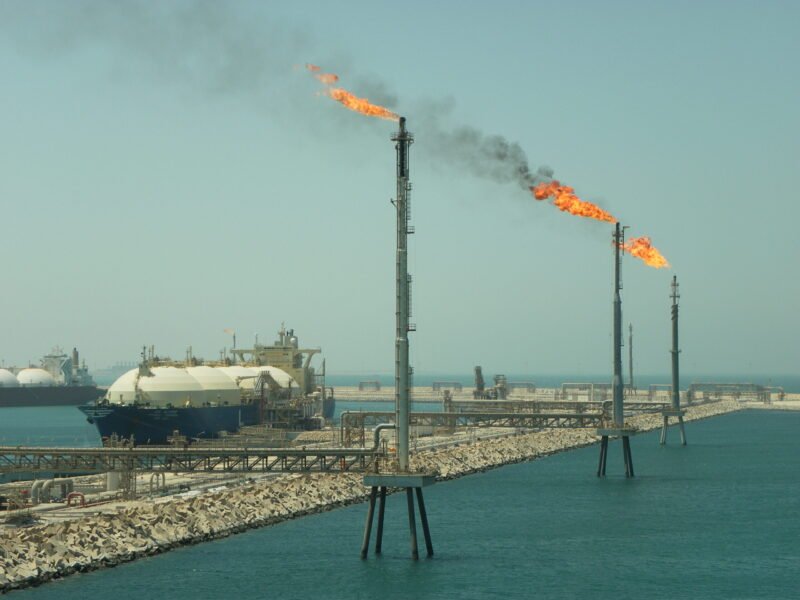
Strait of Hormuz Tensions and LNG Shutdown in Qatar Send Shockwaves Through Markets.
Missiles in the Gulf. Tankers at anchor. Is the world on the brink of an energy shock?
Energy markets jolted sharply higher as the widening conflict between Iran, the United States and Israel began to threaten critical oil and gas infrastructure across the Gulf.
Global benchmark Brent crude briefly climbed to $82 a barrel on Monday after reports that at least three vessels were attacked near the Strait of Hormuz — the narrow waterway through which roughly 20 percent of the world’s oil and gas flows. Iran warned ships against transiting the strait, deepening fears of a supply choke point.
Natural gas markets reacted even more dramatically. Europe’s benchmark gas price surged as much as 50 percent before closing 39 percent higher after QatarEnergy halted liquefied natural gas production following drone strikes on facilities in Ras Laffan Industrial City. Qatar’s defense ministry said the damage was contained, but the suspension rattled traders.
In neighboring Saudi Arabia, Saudi Aramco temporarily shut its Ras Tanura refinery after a drone strike, further tightening concerns about regional output.
Shipping disruptions compounded the volatility. The UK Maritime Trade Operations reported multiple security incidents in the Arabian Gulf and Gulf of Oman. At least 150 tankers dropped anchor outside the Strait of Hormuz, while major operators rerouted vessels to avoid exposure. Danish shipping giant Maersk paused sailings through the Bab el-Mandeb Strait and Suez Canal, diverting around Africa’s Cape of Good Hope.
Equity markets reflected the uncertainty. London’s FTSE 100 fell 1.2 percent, led lower by airlines and banks exposed to energy-sensitive sectors. France’s CAC-40 and Germany’s DAX posted steeper declines. In the United States, the S&P 500 and Nasdaq initially fell but later recovered to close modestly higher.
Analysts cautioned that markets are not yet in crisis mode. “The market isn’t panicking,” said Saul Kavonic of MST Marquee, noting that major oil infrastructure has not been comprehensively disabled. Others warned, however, that a prolonged conflict could push crude above $100 a barrel, feeding global inflation.
Economists say sustained energy price spikes would quickly filter into food, industrial commodities and transport costs. Central banks, including the Bank of England, could be forced to delay planned interest-rate cuts if inflation pressures intensify.
For now, the Strait of Hormuz remains the focal point. As long as tankers hesitate and production remains uncertain, volatility is likely to persist — a reminder that even limited regional conflict can ripple across the global economy within hours.
Middle East
Trump Rebukes Britain as Iran War Strains ‘Special Relationship’
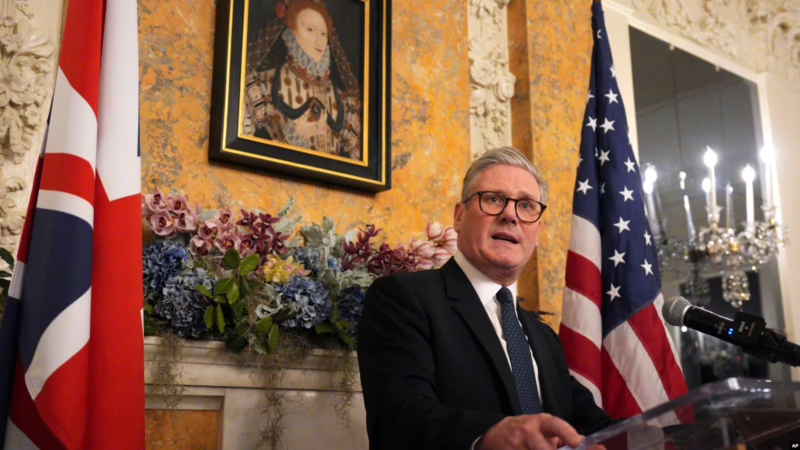
US President Says Historic Alliance Has Changed After UK Hesitation Over Iran Strikes.
From “special relationship” to public frustration — is the Atlantic alliance cracking?
U.S. President Donald Trump said the once “most solid relationship” between Washington and London is “not like it used to be,” signaling a rare public strain in the transatlantic alliance as the Middle East conflict widens.
In an interview with The Sun, Trump criticized British Prime Minister Keir Starmer for initially refusing to allow the United States to use British military bases in operations connected to strikes on Iran.
“This was the most solid relationship of all,” Trump said. “Now we have very strong relationships with other countries in Europe,” singling out France and Germany.
He described Starmer as “not helpful” and said he never expected such hesitation from the United Kingdom. Though he later acknowledged Britain’s decision to permit limited use of bases for what London described as a specific defensive purpose, Trump argued that the approval “took far too much time.”
The disagreement touches on politically sensitive terrain in Britain. Memories of former Prime Minister Tony Blair’s support for the 2003 Iraq invasion continue to shape public and parliamentary caution over Middle East interventions.
Addressing Parliament, Starmer defended his position, saying his duty was to act in Britain’s national interest. “We all remember the mistakes of Iraq,” he said, stressing that any UK involvement must have a lawful basis and a clear strategic plan.
Downing Street confirmed that British bases, including RAF Akrotiri in Cyprus, were not being used by U.S. bombers for offensive operations. The Cypriot base was itself struck by an unmanned drone, which Starmer said had been launched prior to Britain’s policy decision.
The exchange marks one of the sharpest rhetorical breaks in U.S.-UK relations in years. While the alliance remains operationally intact — particularly within NATO — the public tone reflects deeper unease over strategy, escalation and political risk.
For Washington, speed and alignment are strategic necessities in a fast-moving conflict. For London, caution carries domestic and legal weight. The friction underscores a broader reality: even long-standing alliances can bend under the pressure of war.
Top stories
War Expands Across Region as Iranian Militias Join Fight

Embassies struck. Oil refineries targeted. Militias entering the war. The conflict is no longer confined to two countries.
The war between Israel, the United States and Iran widened sharply Monday as Iranian-backed militias joined the confrontation, missiles struck diplomatic and energy targets, and casualties mounted across multiple countries.
Iran and allied groups launched attacks on Israel and several Gulf states hosting American forces. In Kuwait City, fire and smoke were seen rising from inside the U.S. Embassy compound after reported missile or drone impacts. Kuwait’s defense ministry said several American warplanes crashed in the country, though it did not specify the cause. The U.S. military has not publicly confirmed those details.
Iranian officials said at least 555 people have been killed nationwide since the U.S.–Israeli air campaign began, with more than 130 cities reportedly struck. Israeli authorities said 11 people have been killed there in missile attacks.
In Iraq, a pro-Iranian militia claimed responsibility for drone strikes targeting U.S. forces at Baghdad’s airport and previously at Irbil. In Lebanon, Hezbollah said it fired missiles into Israel, prompting extensive Israeli retaliatory strikes that Lebanese authorities say killed at least 31 people.
Energy infrastructure has now entered the battlefield. Saudi Arabia’s Ras Tanura refinery — one of the world’s largest — was targeted by drones, which Saudi defenses said were intercepted. Kuwait and the United Arab Emirates also reported debris and damage linked to aerial interceptions.
Analysts say the strategy appears designed to impose economic pressure. “Gulf energy infrastructure is now squarely in Iran’s sights,” said Torbjorn Soltvedt of Verisk Maplecroft, warning of prolonged uncertainty for global oil markets. Roughly one-fifth of global oil trade passes through the Strait of Hormuz, where maritime tensions are rising.
Meanwhile, Iran’s envoy to the International Atomic Energy Agency accused Washington and Tel Aviv of striking safeguarded nuclear facilities, including Natanz. The United States and Israel have not publicly confirmed those claims.
President Donald Trump said U.S. combat operations would continue “until all objectives are achieved,” adding that further retaliation would be met with force. Britain, France and Germany signaled support for efforts to halt Iranian attacks but urged de-escalation.
The World Health Organization called for the protection of civilians and medical facilities as fighting spreads. With regional militias now active and oil infrastructure under threat, the conflict has entered a broader and more volatile phase — one that risks drawing in additional states and further destabilizing global markets.
Top stories
UK’s Youngest Somali Pilot Takes Off
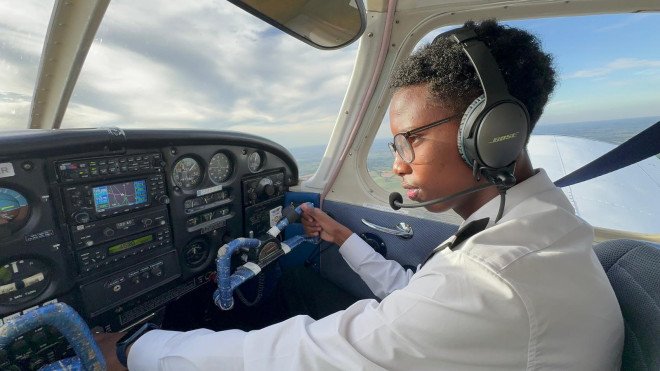
At 16, he flew solo. At 18, he’s chasing the captain’s seat. Meet the young pilot changing representation in British aviation.
At 18 years old, Suleiman Dida has already crossed one of aviation’s most defining thresholds: flying solo. Born in northwest London to parents from Mogadishu, Dida is now recognized as the United Kingdom’s youngest Somali pilot — a milestone in a field where Somali representation has historically been rare.
His fascination with flight began in childhood, watching uniformed pilots stride through terminals during family trips. That early curiosity turned into disciplined preparation. From his bedroom, he built a home flight simulator and logged hours on VATSIM, an online network that mirrors real-world air traffic control communications. It allowed him to practice navigation, phraseology and cockpit procedures long before stepping into a real aircraft.
He began formal flight training at 14. By 16, he completed his first solo flight in a Piper PA-28-140 — a moment widely regarded as one of the most demanding psychological tests for any pilot in training. Taking off, flying circuits and landing without an instructor onboard requires complete control and confidence.
Now working toward his Private Pilot Licence (PPL), Dida continues building hours in single-engine aircraft while preparing for the rigorous academic demands ahead. In the UK, aspiring commercial pilots must pass 14 Airline Transport Pilot Licence (ATPL) theoretical exams covering subjects from meteorology to aerodynamics — a hurdle many describe as among the toughest in aviation.
The path is also expensive. Training can exceed £100,000. Rather than enroll in a full-time academy program, Dida chose the modular route, completing qualifications in stages while managing costs. He began saving toward training expenses while still in primary school.
He has secured a conditional offer with Ryanair to fly the Boeing 737-800 once he completes required certifications and flight hours — a potential first step into commercial aviation.
Long term, his ambitions stretch further. He hopes to command wide-body aircraft like the Boeing 777 for global carriers such as Qatar Airways, Emirates or Ethiopian Airlines. And if Somalia’s national airline returns, he says he would welcome the chance to fly for his country of heritage.
“I didn’t see Somali pilots out there,” he said. “So I wanted to change that.”
Dida’s journey remains in its early stages — still grounded in classrooms and light aircraft rather than airline cockpits. But for many watching, his progress signals a shift: a new generation stepping into industries once seen as out of reach.
“See you in the skies,” he says — and he means it.
Top stories
Dubai, Doha and Abu Dhabi Close Airports
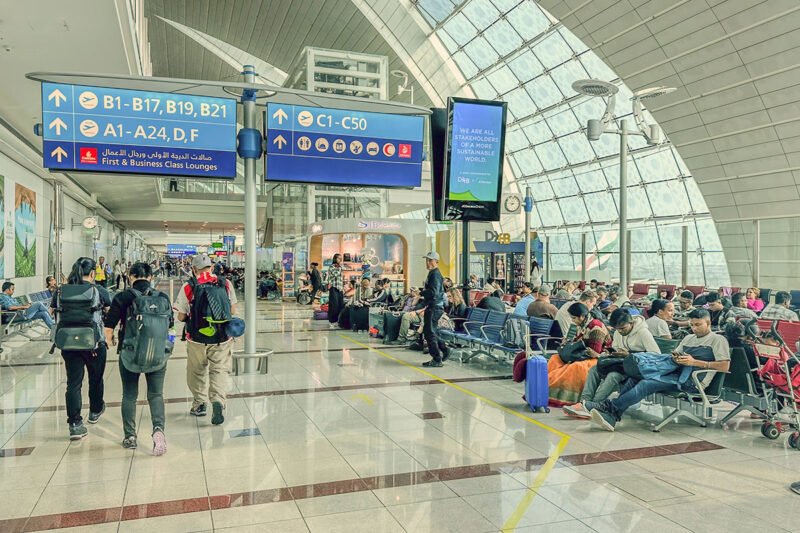
Flights grounded. Airports shut. Hundreds of thousands stranded. The Middle East conflict is now hitting global travel hard.
Air travel across the Middle East plunged into chaos Saturday after US and Israeli strikes on Iran — and Iran’s retaliatory missile attacks — forced major regional hubs to shut down, triggering one of the worst aviation disruptions in years.
Dubai International Airport, the world’s busiest international travel hub handling more than 1,000 flights daily, suspended operations after sustaining damage during overnight missile attacks. Airports in Abu Dhabi and Kuwait were also affected, while Doha’s Hamad International Airport closed as airspace across large parts of the region was shut.
Flight-tracking maps showed skies over Iran, Iraq, Israel, Kuwait and Bahrain nearly empty. Airlines across Europe and Asia rushed to cancel or reroute services as conflict corridors expanded.
Preliminary data from aviation analytics firm Cirium showed airlines canceled roughly half of scheduled flights to Qatar and Israel, and about 28 percent of flights to Kuwait. Overall, nearly a quarter of all flights to the Middle East were scrapped.
“The scale of these hubs today is enormous,” said UK aviation analyst John Strickland. “You will have hundreds of thousands of people stuck in the wrong parts of the world without certainty about when they can move.”
Dubai and Doha sit at the center of global east-west air travel, connecting Europe and Asia through tightly synchronized long-haul networks. Any prolonged shutdown ripples worldwide, disrupting cargo operations and passenger routes far beyond the region.
Eric Schouten, head of aviation security advisory Dyami, warned that airspace closures may last. “Passengers and airlines can expect airspace to be shut for quite some time,” he said.
The crisis adds to growing aviation strain since the Russia-Ukraine war restricted key flight paths. Conflict zones increase operational risk, raise fears of accidental aircraft shootdowns, and force longer routes that drive up fuel costs.
At Paris’s Charles de Gaulle Airport, travelers bound for Asia scrambled for alternatives after connecting flights via Doha were canceled. In Dubai, stranded passengers faced uncertainty, while tracking platform Flightradar24 briefly crashed under surging demand.
The European Union Aviation Safety Agency advised airlines to avoid affected airspace until further notice.
What began as a military escalation has quickly evolved into a global transport emergency — underscoring how tightly the world’s travel networks are linked to Middle Eastern stability.
Top stories
US–Israel Strike Iran, Region Erupts as Missiles Hit Riyadh
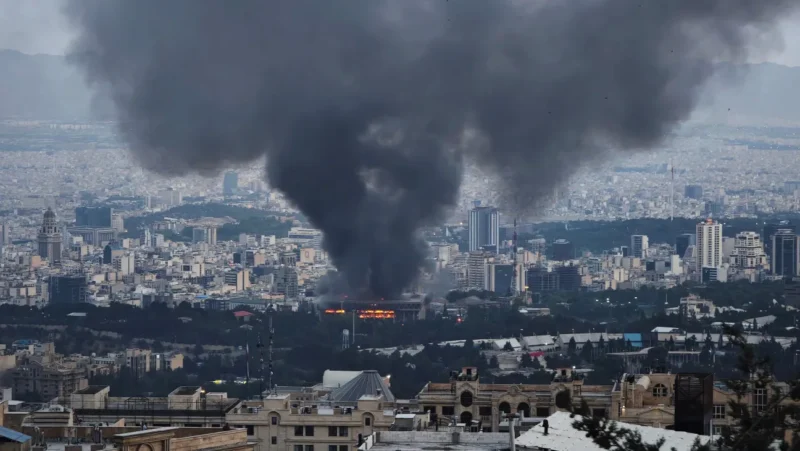
Tehran hit. Riyadh targeted. Missiles flying across borders. Is the Middle East entering a full-scale war?
The United States and Israel launched coordinated military strikes on Iran on Saturday, targeting what officials described as senior leadership and strategic security sites, triggering a rapid and dangerous escalation across the Middle East.
Explosions were reported in Tehran as the joint operation unfolded. President Donald Trump said the action was intended to eliminate a direct security threat to the United States and open space for political change inside Iran.
Tehran denounced the strikes as “unprovoked and illegal,” vowing consequences. Within hours, Iran launched retaliatory missile attacks against Israel and several Gulf countries hosting American military bases.
Saudi Arabia confirmed that missiles struck Riyadh and parts of its Eastern Province but said its air defenses repelled the attacks. The Saudi foreign ministry issued a sharp condemnation, describing the strikes as “blatant and cowardly Iranian attacks.”
“In light of this unjustified aggression, the Kingdom affirms that it will take all necessary measures to defend its security and protect its territory, citizens and residents,” the statement said, adding that retaliation remains an option.
The rapid exchange marks one of the most direct confrontations between Washington and Tehran in decades. The scope of the US-Israeli strike has not been fully detailed, but officials indicated that key security targets were hit.
Iran’s response broadened the battlefield, drawing Gulf states into the crisis. Several countries in the region host significant US military installations, raising fears of further strikes.
Regional governments are now on high alert. Air defense systems have been activated across multiple capitals, and commercial aviation routes are being reassessed as security conditions deteriorate.
Diplomatic channels appear strained. There has been no immediate indication of emergency talks, though international leaders are expected to push for de-escalation.
With missiles exchanged and capitals targeted, the conflict has shifted from brinkmanship to open confrontation. The coming hours may determine whether this remains a contained military exchange — or evolves into a broader regional war.
Top stories
Macron Signals Nuclear Shift as Europe Questions U.S. Shield

French President to Outline Deterrence Strategy at Submarine Base Amid Doubts Over American Nuclear Guarantees.
President Emmanuel Macron will travel Monday to France’s top-secret Île Longue submarine base to deliver a major speech on the country’s nuclear doctrine — a signal that Europe’s security landscape may be entering a new and uncertain phase.
The base, home to France’s four nuclear-armed submarines, provides a stark backdrop. Each vessel carries up to 16 M51 intercontinental ballistic missiles equipped with multiple warheads. As France’s commander in chief, Macron alone holds the authority to order their use.
The timing is significant. Russia’s war in Ukraine grinds on, Moscow has lowered its threshold for nuclear retaliation, and China and North Korea are expanding their arsenals. At the same time, questions have surfaced in parts of Europe about whether the United States would risk its own cities to defend European capitals under President Donald Trump.
For decades, U.S. nuclear weapons stationed in Europe formed the backbone of NATO’s deterrence strategy. But some European officials now speak more openly about contingency planning.
Rasmus Jarlov, chair of Denmark’s parliamentary defense committee, voiced the concern bluntly. “If things got really serious, I very much doubt that Trump would risk American cities to protect European cities,” he said, adding that Europe may need to look to France in the short term.
France is the European Union’s only nuclear-armed member. Macron previously stated in 2020 that France maintains fewer than 300 warheads — a stockpile he said was sufficient to inflict “absolutely unacceptable damage” on any state threatening France’s “vital interests,” which he noted have a “European dimension.”
Defense analysts will be listening carefully for signals of change: whether Macron expands the definition of France’s protective umbrella, increases cooperation with European partners, or hints at adjustments to arsenal size or deployment.
Germany has already opened discussions. Chancellor Friedrich Merz has acknowledged “initial talks” about nuclear deterrence, even publicly floating the idea that German aircraft could one day carry French nuclear weapons.
The language of deterrence is intentionally ambiguous, designed to keep adversaries guessing. But even subtle shifts in tone matter. With just 14 months left in his presidency, Macron’s remarks could shape Europe’s security doctrine for years to come.
As uncertainty clouds transatlantic guarantees, one question hangs over the Atlantic: if America’s shield weakens, will France’s nuclear force step into a broader European role?
-

 Somaliland1 month ago
Somaliland1 month agoF-35s Over Hargeisa: The Night Somaliland’s Sovereignty Went Supersonic
-

 Somalia2 months ago
Somalia2 months agoAid Destroyed, Trust Shattered: Somalia Loses U.S. Support for Good
-

 Terrorism2 months ago
Terrorism2 months agoForeign ISIS Pipeline Exposed: Puntland Captures Dozens of Non-Somali Fighters
-

 Somaliland1 month ago
Somaliland1 month agoSomaliland at Davos: The Moment Somaliland Entered the World’s Inner Circle
-

 Terrorism1 month ago
Terrorism1 month agoAmerica Pulls Back From Somalia but Doubles Down Next Door
-

 Top stories2 months ago
Top stories2 months agoSomali Pirates Hijack Chinese Fishing Vessel off Puntland Coast
-

 Opinion2 months ago
Opinion2 months agoTurkey’s Selective Morality: From the Ruins of Gaza to the Red Sea
-

 Middle East2 months ago
Middle East2 months agoUS War Plans Against Iran Enter Advanced Stage


